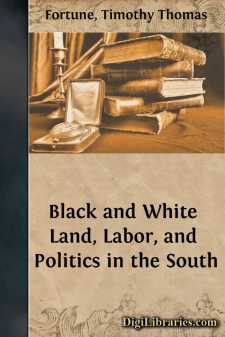Categories
- Antiques & Collectibles 13
- Architecture 36
- Art 48
- Bibles 22
- Biography & Autobiography 813
- Body, Mind & Spirit 142
- Business & Economics 28
- Children's Books 17
- Children's Fiction 14
- Computers 4
- Cooking 94
- Crafts & Hobbies 4
- Drama 346
- Education 46
- Family & Relationships 57
- Fiction 11829
- Games 19
- Gardening 17
- Health & Fitness 34
- History 1377
- House & Home 1
- Humor 147
- Juvenile Fiction 1873
- Juvenile Nonfiction 202
- Language Arts & Disciplines 88
- Law 16
- Literary Collections 686
- Literary Criticism 179
- Mathematics 13
- Medical 41
- Music 40
- Nature 179
- Non-Classifiable 1768
- Performing Arts 7
- Periodicals 1453
- Philosophy 64
- Photography 2
- Poetry 896
- Political Science 203
- Psychology 42
- Reference 154
- Religion 513
- Science 126
- Self-Help 84
- Social Science 81
- Sports & Recreation 34
- Study Aids 3
- Technology & Engineering 59
- Transportation 23
- Travel 463
- True Crime 29
Black and White Land, Labor, and Politics in the South
Categories:
Description:
Excerpt
CHAPTER I
Black
There is no question to-day in American politics more unsettled than the negro question; nor has there been a time since the adoption of the Federal Constitution when this question has not, in one shape or another, been a disturbing element, a deep-rooted cancer, upon the body of our society, frequently occupying public attention to the exclusion of all other questions. It appears to possess, as no other question, the elements of perennial vitality.
The introduction of African slaves into the colony of Virginia in August, 1619, was the beginning of an agitation, a problem, the solution of which no man, even at this late date, can predict, although many wise men have prophesied.
History—the record of human error, cruelty and misdirected zeal—furnishes no more striking anomaly than the British Puritan fleeing from princely rule and tyranny and dragging at his heels the African savage, bound in servile chains; praying to a just God for freedom, and at the same time riveting upon his fellow-man the gyves of most unjust and cruel slavery. A parallel for such hypocrisy, such sacrilegious invocation, is not matched in the various history of peoples.
It did not matter to the early settlers of the American colonies that, in the memorable struggle for the right to be represented if taxed, a black man—Crispus Attucks, a full-blooded Negro—died upon the soil of Massachusetts, in the Boston massacre of 1770, in common with other loyal, earnest men, as the first armed protest against an odious tyranny; it did not matter that in the armies of the colonies, in rebellion against Great Britain, there were (according to the report of Adjutant General Scammell), on the 24th day of August, 1778, 755 regularly enlisted negro troops; it did not matter that in the second war with Great Britain, General Andrew Jackson, on the 21st day of September, 1814, appealed to the "free colored people of Louisiana" as "sons of freedom," who were "called upon to defend our most inestimable blessing," the right to be free and sovereign, and to "rally around the standard of the eagle, to defend all which is dear in existence;" it did not matter that in each of these memorable struggles the black man was called upon, and responded nobly, to the call for volunteers to drive out the minions of the British tyrant. When the smoke of battle had dissolved into thin air; when the precious right to be free and sovereign had been stubbornly fought for and reluctantly conceded; when the bloody memories of Yorktown and New Orleans had passed into glorious history, the black man, who had assisted by his courage to establish the free and independent States of America, was doomed to sweat and groan that others might revel in idleness and luxury. Allured, in each instance, into the conflict for National independence by the hope held out of generous reward and an honest consideration of his manhood rights, he received as his portion chains and contempt. The spirit of injustice, inborn in the Caucasian nature, asserted itself in each instance....


